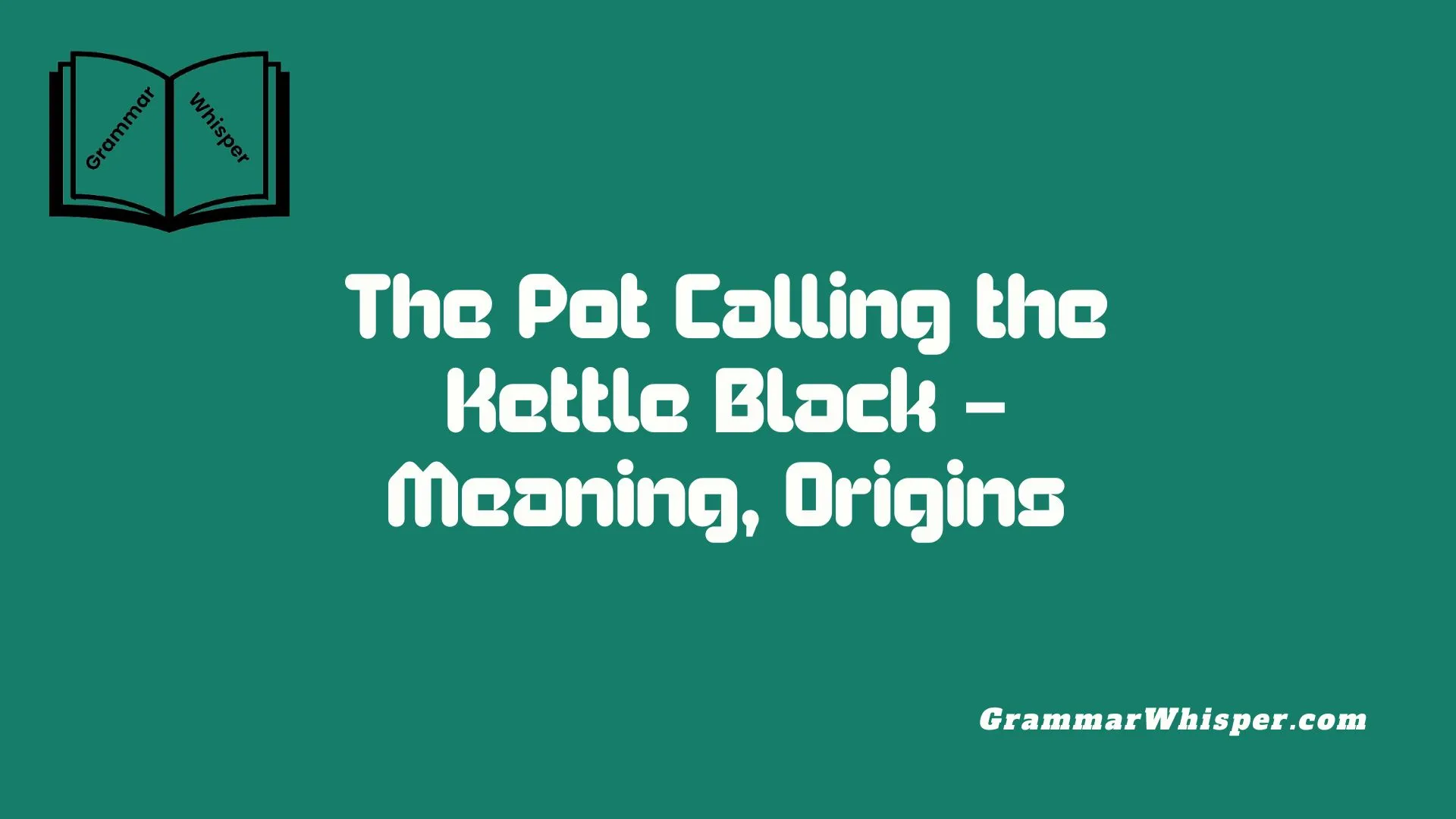The moment someone yells, “You’re being dramatic,” while doing just that themselves, you’re witnessing the pot calling the kettle black. It’s a classic example of hypocrisy, a trait that’s been around for centuries. The phrase remains one of the most powerful idioms in the English language, known for its vivid, relatable impact. Whether in workplace conversations or heated debates on social media, people often call others out without realizing they’re just as guilty. That’s where the irony strikes. We, as humans, have a psychological tendency to project our flaws onto others – sometimes without even noticing.
Paragraph 2 From firsthand experience in team environments, it’s easy to see how quickly things escalate when someone accuses another of bad behavior, only to mirror that behavior later. That’s when the idiom lands with a serious punch. And no – it’s not just about old cookware or layers of soot. It’s about the hidden smoke that lingers behind how we speak and act. These verbal habits are windows into deeper cultural and emotional patterns. The phrase isn’t just quirky, it’s relevant. To explore, unpack, and really dive into our own actions – that’s what matters. Because if we’re not willing to listen to ourselves, how can we expect others to?
What Does “The Pot Calling the Kettle Black” Really Mean?
At its core, this idiom describes a situation where someone criticizes another person for a flaw they themselves possess. It’s a sharp accusation of hypocrisy, often pointing out a lack of self-awareness.
For example:
A manager berating an employee for being late – while frequently showing up late themselves.
In modern usage, it serves as a way to call out unfair or ironic criticism, especially when the critic shares the same behavior or flaw.
Common Interpretations:
- Calling out hypocrisy
- Pointing to projection
- Highlighting irony in judgment
It’s an idiom that doesn’t just describe an action – it reveals a mindset.
The Surprising Origins of the Phrase
The phrase “The pot calling the kettle black” has roots in early 17th-century Spain. The first traceable reference appears in Miguel de Cervantes’ Don Quixote, published in 1605:
“You are like what is said that the frying-pan said to the kettle: ‘Get away, blackbreech!’”
How It Entered English
The phrase traveled to English idiom use by the late 1600s, evolving into a metaphorical jab at shared faults. It became popular in British satire and literature, often used to mock politicians or clergy.
From Metalware to Metaphor: The Shift from Literal to Figurative
To understand this idiom fully, it helps to visualize what pots and kettles looked like in the 1600s. Both were made of cast iron and used over open flames, causing them to turn black from soot.
So, when a pot accuses a kettle of being black – it’s ignoring its own soot-covered surface. The insult is hilariously ironic.
Historical Relevance
In pre-industrial kitchens:
- Most cookware was blackened by fire.
- Cleaning methods were crude.
- The image of two blackened items arguing was absurd – and thus, effective.
The idiom gained traction because it made self-righteousness look ridiculous.
Cross-Cultural Equivalents and International Variants
Hypocrisy is a universal concept – and so are idioms that describe it. While the English version uses cookware, other cultures draw on their own imagery.
Idioms from Around the World
| Language | Idiom | Translation | Meaning |
| French | “C’est l’hôpital qui se moque de la charité” | “It’s the hospital mocking the charity” | Accusing someone of your own fault |
| Russian | “Кто бы гыкал, как не ты” | “Who’s mooing? Not you!” | Deflecting your own flaw |
| Urdu | “الزُم بلا عیب” | “Blaming others while being flawed” | Same hypocrisy call-out |
| Mandarin | “大鬼笑小鬼” | “Big ghost laughs at little ghost” | Criticizing someone for what you also do |
These variants show how widely understood – and mocked – hypocrisy is.
The Idiom’s Psychological Core: Projection and Irony
The power of this idiom isn’t just in language. It has deep psychological roots.
Projection
A defense mechanism where someone denies their own flaws and assigns them to others.
Example:
- A dishonest person constantly accuses others of lying.
Irony in Criticism
- The phrase reflects the absurdity of criticizing someone for a behavior you display.
- It exposes the critic more than the accused.
Hypocrisy vs Self-Unawareness
- Conscious hypocrisy: Knowing you’re guilty but pointing fingers anyway.
- Unconscious hypocrisy: Genuinely believing you’re faultless, even when you’re not.
Tu Quoque Fallacy: A Logical Twist
The tu quoque fallacy (Latin for “you too”) occurs when someone dismisses criticism by pointing out the accuser’s similar behavior.
Example:
“You can’t tell me to stop drinking soda – you drink it too!”
How It Connects to the Idiom
- When used defensively, “the pot calling the kettle black” can be a diversion tactic.
- It may deflect rather than address the issue.
Not all uses of the idiom are insightful – some can derail meaningful discussion.
The Idiom in Pop Culture, Media, and Social Media
This phrase isn’t stuck in old books. It’s alive in pop culture – often in dramatic or ironic contexts.
Television and Film
- Game of Thrones: Cersei Lannister condemns betrayal while backstabbing everyone herself.
- Breaking Bad: Walter White blames others while building a drug empire.
Social Media
- Used in quote tweets or meme formats to highlight hypocrisy
- Often paired with a side-by-side comparison
Example Meme:
A climate change denier tweeting about rising food prices – cue the idiom.
Modern Appeal
- The phrase is short, punchy, and memeable.
- It works across formats: TikTok, Instagram captions, Reddit debates.
Literature’s Longstanding Love Affair with Hypocrisy
Writers have long explored hypocrisy through storytelling.
Classic Examples
- Aesop’s Fables: The Fox and the Grapes – rationalizing flaws
- Shakespeare: Characters like Iago use duplicity as weapons
- George Orwell: Animal Farm embodies political hypocrisy
Literature often shows how easy it is to see others’ flaws, but hard to face your own.
Charles H. Bennett’s Illustration
Bennett’s satirical artwork in the 1850s famously visualized the idiom: a soot-covered pot and kettle arguing. His work helped cement the image in public consciousness.
Modern-Day Examples of Hypocrisy in Everyday Life
We see “pot/kettle” scenarios every day – from households to headlines.
Common Situations
| Scenario | Pot’s Behavior | Kettle’s Behavior |
| Workplace | Manager misses deadlines | Criticizes staff for delays |
| Parenting | Parent glued to phone | Scolds child for screen time |
| Politics | Candidate changes stance | Accuses rival of flip-flopping |
| Social Justice | Influencer preaches ethics | Gets exposed for unethical behavior |
Case Study: Tech Industry
A major tech CEO publicly condemned data privacy breaches – weeks later, their own company was found harvesting user data.
How to Recognize If You’re the Pot
No one wants to admit they might be hypocritical – but we all have blind spots.
Questions for Reflection:
- Am I criticizing something I also do?
- Have I made similar mistakes in the past?
- What’s my motivation for pointing this out?
Self-Check Tips
- Pause before judgment
- Ask someone you trust for honest feedback
- Look for patterns in your complaints about others
How to Respond If You’re the Kettle
Being called out – fairly or not – is uncomfortable. But it doesn’t have to be destructive.
Steps to Handle It Gracefully:
- Listen first – Check if the critique is valid.
- Acknowledge your part – Own your actions.
- Call for shared accountability – Don’t ignore the pot’s behavior, but don’t deflect.
What NOT to Do:
- Don’t respond with “Yeah, but you…”
- Avoid sarcasm or defensiveness
Growth starts where ego ends.
Why Idioms Like This Stick Around
Language evolves, but idioms like “the pot calling the kettle black” endure. Why?
Because they:
- Capture complex ideas simply
- Use vivid, visual metaphors
- Tap into shared human flaws
- Serve as social checks on behavior
Using the Idiom Effectively in Modern Conversations
While this phrase is popular, it can lose impact if used carelessly.
When It Works:
- To highlight clear, ironic hypocrisy
- In storytelling, journalism, or analysis
When to Avoid It:
- During sensitive conversations
- As a cheap comeback or debate tactic
Alternatives to Try:
- “That’s a bit rich coming from you.”
- “Look who’s talking.”
- “Glass houses, much?”
Final Thoughts
Hypocrisy isn’t always malicious – sometimes it’s blind. But idioms like this help us hold up a mirror and think twice before we speak.
So next time you’re tempted to point out someone’s flaw, ask yourself:
“Am I just the pot looking at another kettle?”
Understanding this phrase isn’t just about language. It’s about growth, awareness, and living with integrity – even when no one’s watching.
Quick Recap Table
| Element | Details |
| Idiom | “The pot calling the kettle black” |
| Meaning | Criticizing someone for a fault you also have |
| Origin | Don Quixote (1605), Spanish proverb |
| Core Themes | Hypocrisy, irony, projection |
| Modern Use | Pop culture, social media, political debates |
| Psychology | Defense mechanisms, tu quoque fallacy |
FAQs
What does “the pot calling the kettle black” mean in simple terms?
It means someone is accusing another person of a fault they also have. It’s a way of pointing out hypocrisy or ironic criticism.
Is “the pot calling the kettle black” a negative phrase?
Yes, it typically carries a negative tone. It’s used to highlight hypocrisy, often in a sarcastic or critical way.
Where did the idiom “the pot calling the kettle black” originate?
The phrase dates back to Miguel de Cervantes’ Don Quixote (1605) and was later popularized in English literature in the 1600s. It refers to old iron cookware blackened by fire.
Can this idiom be used in formal writing?
Yes, but with caution. While it’s acceptable in opinion pieces, articles, or commentary, it may not be appropriate for highly formal or academic contexts unless used metaphorically and explained.
Are there other idioms similar to “the pot calling the kettle black”?
Yes, similar expressions include:
- “People who live in glass houses shouldn’t throw stones.”
- “Look who’s talking.”
- “That’s a bit rich coming from you.”











